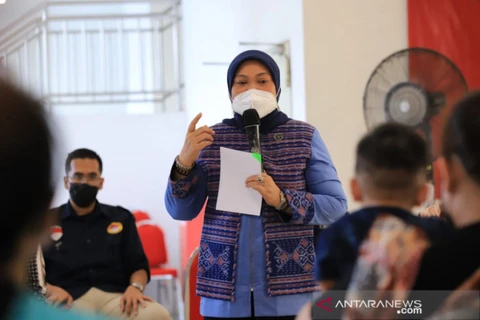Jakarta (VNA) – Indonesia needs at least 266 billion USD to fund the government's efforts to overcome climate change until 2030, according to Finance Minister Sri Mulyani Indrawati.
This means that mitigation of spending in ministries meets only 21 percent of the funding needed to achieve the 2060 Paris commitment or net zero emissions, the minister said on August 26.
Meanwhile, the state’s Revenue and Expenditure Budget (APBN) was tagged with a 4.1 percent budget for climate change each year from 2016 to 2020, she said.
She added that some local governments have begun allocating funds from the Regional Budget (APBD) since 2019 to support Indonesia’s efforts to tackle climate change.
She said that Indonesia’s National Budget (APBN) could not meet its climate change promises and that its funding would require funding from both the domestic and global private sectors.
Therefore, the government continues to develop policies to attract more investment to develop key climate change-determining sectors such as forestry, energy and transportation, waste, agriculture and industry, and sets CO2 reduction targets.
The minister emphasised that omnibus reforms that have changed the country’s investment climate will have many positive impacts on Indonesia and will allow it to attract investment and technology for sustainable development.
In addition, she explained that various financial instruments such as tax exemption periods, tax deductions and value-added tax (VAT) facilities related to the Green Project are still provided./.
This means that mitigation of spending in ministries meets only 21 percent of the funding needed to achieve the 2060 Paris commitment or net zero emissions, the minister said on August 26.
Meanwhile, the state’s Revenue and Expenditure Budget (APBN) was tagged with a 4.1 percent budget for climate change each year from 2016 to 2020, she said.
She added that some local governments have begun allocating funds from the Regional Budget (APBD) since 2019 to support Indonesia’s efforts to tackle climate change.
She said that Indonesia’s National Budget (APBN) could not meet its climate change promises and that its funding would require funding from both the domestic and global private sectors.
Therefore, the government continues to develop policies to attract more investment to develop key climate change-determining sectors such as forestry, energy and transportation, waste, agriculture and industry, and sets CO2 reduction targets.
The minister emphasised that omnibus reforms that have changed the country’s investment climate will have many positive impacts on Indonesia and will allow it to attract investment and technology for sustainable development.
In addition, she explained that various financial instruments such as tax exemption periods, tax deductions and value-added tax (VAT) facilities related to the Green Project are still provided./.
VNA























